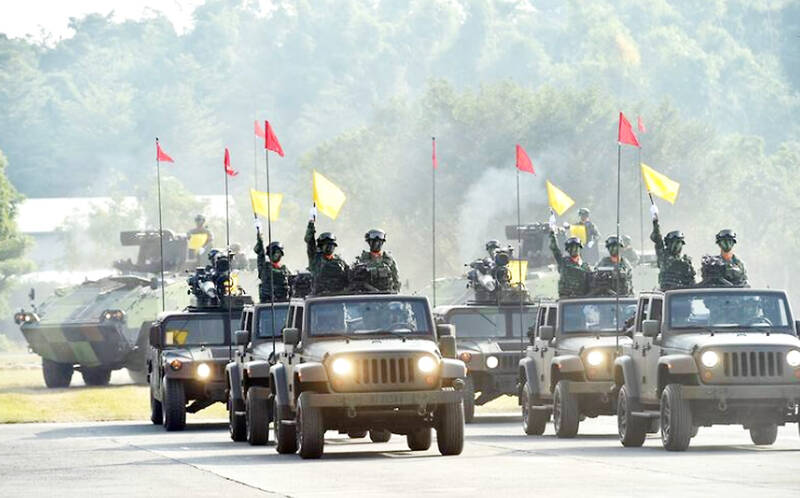The Ministry of National Defense has terminated a contract for maintenance of army jeeps with Idano Co (壹達諾汽車系統) after finding Chinese parts in components supplied by the firm, a high-ranking defense official said yesterday.
The Army Command Headquarters said it terminated the contract following a review of internal reports released in May that showed the contractor was supplying the military’s Storm 3 light tactical utility vehicles with parts made in China.
The command requested and obtained ministry authorization to terminate the contract, it said, adding that army units are to individually source parts for their vehicles until a new service-wide contract is awarded.

Photo: Military News Agency
Idano in November last year was awarded a NT$200 million (US$6.35 million) contract to maintain the military’s Storm 3 utility trucks, said the official, who asked to remain anonymous.
The company sourced the parts from subcontractors, the official added.
The move was widely criticized by lawmakers and media firms, as Idano had a net worth of just NT$1 million at the time, the official said.
Military personnel complained about poor quality control of parts supplied by Idano and the discovery of Chinese parts was the last straw for army brass, the official said.
In 2009, the ministry awarded Sanyang Motors (三陽工業) and AEI, an Israel-based firm, a NT$4.8 billion contract to supply the armed forces with 3,598 Storm 3 vehicles to replace M151 jeeps and several types of Humvee.
The military ordered three Storm 3 variants, the soft-top, the soft-top with a machine gun mount and the hard-top.
The project was plagued with production issues, including headlights that failed to meet army standards, which delayed initial delivery of the vehicles from 2011 to late 2015.
Some military units that received the trucks have complained about their build quality.
The army has said that the Storm 3 project was conducted in accordance to the law.
In other news, the ministry on Monday announced that the Chungshan Institute of Science and Technology has been awarded a NT$916 million limited-bidding contract to maintain the army’s 17 CS/MPQ-90 Bee Eye mobile air defense phased array radar systems until December 2025.
The Bee Eye contract ensures the continued maintenance of the army’s mobile radar systems after the expiry of the manufacturer’s two-year warranty following their deployment in 2014, contract notification documents showed.
The contract allocated NT$204.39 million for this year, but gave no details about figures beyond that.
The vehicle-mounted radar systems are a key component of the military’s airspace defense, with their mobility providing an advantage over fixed systems if they are attacked.
Eleven more Bee Eye systems have been ordered to be deployed in Taiwan’s outlying counties starting this year.
Additional reporting by Aaron Tu

CHAOS: Iranians took to the streets playing celebratory music after reports of Khamenei’s death on Saturday, while mourners also gathered in Tehran yesterday Iranian Supreme Leader Ayatollah Ali Khamenei was killed in a major attack on Iran launched by Israel and the US, throwing the future of the Islamic republic into doubt and raising the risk of regional instability. Iranian state television and the state-run IRNA news agency announced the 86-year-old’s death early yesterday. US President Donald Trump said it gave Iranians their “greatest chance” to “take back” their country. The announcements came after a joint US and Israeli aerial bombardment that targeted Iranian military and governmental sites. Trump said the “heavy and pinpoint bombing” would continue through the week or as long

TRUST: The KMT said it respected the US’ timing and considerations, and hoped it would continue to honor its commitments to helping Taiwan bolster its defenses and deterrence US President Donald Trump is delaying a multibillion-dollar arms sale to Taiwan to ensure his visit to Beijing is successful, a New York Times report said. The weapons sales package has stalled in the US Department of State, the report said, citing US officials it did not identify. The White House has told agencies not to push forward ahead of Trump’s meeting with Chinese President Xi Jinping (習近平), it said. The two last month held a phone call to discuss trade and geopolitical flashpoints ahead of the summit. Xi raised the Taiwan issue and urged the US to handle arms sales to

State-run CPC Corp, Taiwan (CPC, 台灣中油) yesterday said that it had confirmed on Saturday night with its liquefied natural gas (LNG) and crude oil suppliers that shipments are proceeding as scheduled and that domestic supplies remain unaffected. The CPC yesterday announced the gasoline and diesel prices will rise by NT$0.2 and NT$0.4 per liter, respectively, starting Monday, citing Middle East tensions and blizzards in the eastern United States. CPC also iterated it has been reducing the proportion of crude oil imports from the Middle East and diversifying its supply sources in the past few years in response to geopolitical risks, expanding

Pro-democracy media tycoon Jimmy Lai’s (黎智英) fraud conviction and prison sentence were yesterday overturned by a Hong Kong court, in a surprise legal decision that comes soon after Lai was jailed for 20 years on a separate national security charge. Judges Jeremy Poon (潘兆初), Anthea Pang (彭寶琴) and Derek Pang (彭偉昌) said in the judgement that they allowed the appeal from Lai, and another defendant in the case, to proceed, as a lower court judge had “erred.” “The Court of Appeal gave them leave to appeal against their conviction, allowed their appeals, quashed the convictions and set aside the sentences,” the judges